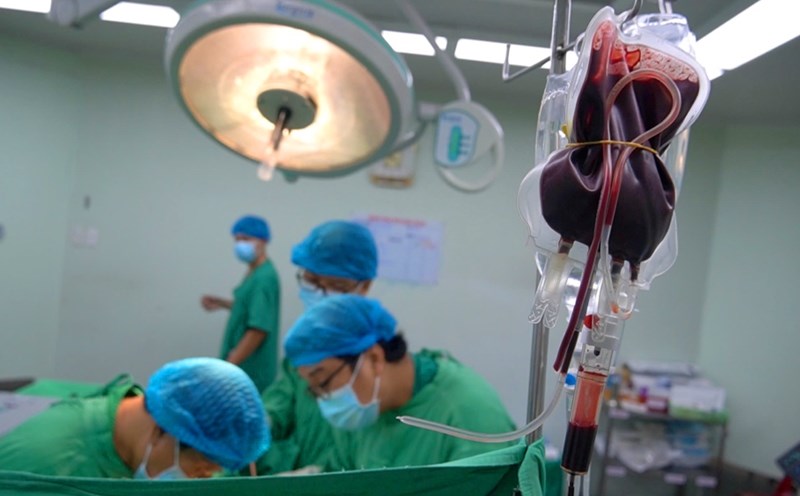Ho Chi Minh City's blood volume has dropped sharply
In July 2025, the amount of blood received only reached more than 25,000 bags, a decrease of nearly 2,600 bags compared to the plan and the amount of blood rushed exceeded the number received.
The city's blood reserves also fell sharply from more than 9,400 blood bags at the beginning of the month to 6,700 bags at the end of the month. The health sector is concerned that if this trend continues, it will seriously affect emergency care and treatment.
According to Ho Chi Minh City Hematology and Blood Transfusion Hospital, the work of mobilizing blood donation in the first 6 months of the year and deploying tasks in the last 6 months of 2025, the results showed that at some times, the amount of blood received decreased by 20-30% compared to the amount of blood supplied; Cho Ray Hospital alone decreased by over 50%, directly affecting the ability to support areas 2 and 3.
The main reason comes from the summer vacation, which reduces the main blood donation force of students; the merger of administrative boundaries has caused the Grassroots Blood Donation Steering Committee to not be strengthened. Along with that, the demand for blood for emergency care and treatment in June and July increased dramatically.
In the face of declining blood reserves, Ho Chi Minh City needs to urgently deploy synchronous solutions to ensure enough blood and blood products for emergency care and treatment throughout the city.
Mr. Nguyen Anh Dung - Deputy Director of the Ho Chi Minh City Department of Health - said that the city needs to strengthen communication and mobilization of blood donation at the same time, organize peak campaigns associated with community events, create strong influence and attract a large number of people to participate.
Complete the Steering Committee for mobilizing grassroots blood donation.As of August 1, 2025, the whole city has only 30/168 units completing the establishment, this rate has not met the requirements set out in the current situation, the delay in perfecting the Steering Committee directly affects the implementation efficiency in the locality.
Mekong Delta prioritizes emergency care
Due to difficulties in mobilizing voluntary blood donation, many hospitals in the Mekong Delta are currently experiencing anemia in emergency care and treatment, and doctors have to use blood at a low cost.
Talking to reporters, specialist II Le Hoang Phuc, Head of the General Planning Department of Can Tho Central General Hospital (the final hospital of the Ministry of Health in the region) informed that on average, 700 - 800 units of blood are needed per week, but due to the decrease in supply from Can Tho City Hematology - Blood Transfusion Hospital, the hospital has to implement many solutions.
The hospital is only provided with about 10 - 20% of the actual needs, so we have contacted the HCMC Hematology - Blood Transfusion Hospital to provide a significant amount of blood for emergency care and treatment. The hospital's leaders, based on professional requirements, notify departments and rooms that require the use of blood according to regulations, prioritizing emergency cases. In some cases, it will have to be temporarily delayed so that when the blood supply is stable, it can be done, said Dr. Phuc.
Doctor Phuc added that in the next 2 - 3 months, if blood volume does not improve, it will affect the health care of people.
At the Department of Humanitarian Blood Donation at Can Tho Hematology and Blood Transfusion Hospital, Dr. Nguyen Xuan Khoi informed that often, from the mobilization work, provinces and cities in the Mekong Delta region will register to donate from 15,000 - 18,000 units of blood/month. Through health condition testing, the amount collected is about 12,000 units/month. However, statistics since April show that the Department has only received about 7,000 units of blood. By July, the registration schedule from provinces and cities was low.
According to the reporter's records from July 2025, inside the Blood Archives, under the screening - adjustment - discharge department of the Hospital, there are estimated to be several hundred units.
Doctor Huynh Minh Phu - Director of Can Tho City Hematology and Blood Transfusion Hospital - said: "The hospital is making every effort to synchronously implement solutions, trying not to fall into a passive position. Because upper-level hospitals are also facing similar difficulties. To prevent blood supply from being interrupted, the Hospital urgently calls for the cooperation of the community, and really needs new hearts, more people are willing to share precious drops of blood".











